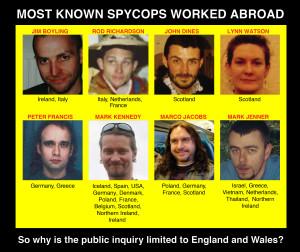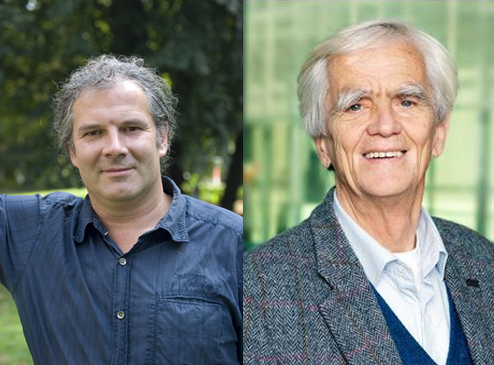Germany Asks to Join Spycops Inquiry
 The German government have formally asked to be included in the forthcoming Pitchford inquiry into undercover policing. Five officers from Britain’s political secret police units are known to have been in the country.
The German government have formally asked to be included in the forthcoming Pitchford inquiry into undercover policing. Five officers from Britain’s political secret police units are known to have been in the country.
Special Demonstration Squad whistleblower Peter Francis says he was the first officer to work abroad when he was sent to an anti-racist gathering in Bavaria in 1995. Francis was accompanied by his handler who stayed in a nearby hotel – the infamous former officer turned overseer Bob Lambert. The recently exposed officer known as RC is also reported to have been in Germany around ten years after Francis.
Mark Kennedy was also a frequent visitor to the country, and in 2007 went with fellow officer Marco Jacobs. Kennedy was arrested in 2006 in Berlin for arson after setting fire to a dumpster, and again at an anti-G8 protest in 2007. He gave his false name to authorities which – along with arson, of course – is a crime in Germany.
Like the Scottish government’s similar request, the German demand follows years of sustained effort by parliamentarians from the left-wing and Green parties. Tenacious parliamentarian Andrej Hunko has been working on this since Kennedy was first uncovered, and this week he welcomed his government’s call and spelled out the seriousness and breadth of the issue.
SCOTLAND WAITS AND WAITS
The forthcoming Pitchford inquiry is planning to only examine actions of spycops in England and Wales. As the majority of exposed officers were active in Scotland (and Scottish chief constable Phil Gormley had oversight of both spycops units at the key time) it is patently absurd to exclude Scotland from the inquiry.
Despite their government formally asking to be included last year, and even Tories demanding Theresa May accede, there has been no real response. It has been six months now, yet we have merely been told time and again that “talks are ongoing”.
With the preliminary sessions of the inquiry mostly over, it is starting to look like the Home Office is simply stalling and that the lack of a response will effectively become a refusal once the inquiry begins.
For their part, two representatives of the inquiry fielded questions at the recent conference hosted by the Monitoring Group and Centre for Crime and Justice Studies. They told those attending that it would be nonsense to exclude part of an officer’s story just because it happened abroad, and the inquiry would want the full picture.
Whilst this is some comfort, it is far from good enough. Firstly, the spoken assurance of underlings is very different to the declared decision of the Chair.
More importantly, it avoids many of the real issues. Spying abroad raises questions far beyond the officers’ own stories. Who organised it? Who decided their remit and purpose? How much did the host country know? Who is responsible for crimes committed by officers whilst abroad?
Peter Francis says SDS officers were given
absolutely zero schooling in any law whatsoever. I was never briefed, say for example, if I was in Germany I couldn’t do, this for example, engage in sexual relationships or something else.
NORTHERN IRELAND ALSO IN THE QUEUE
The Police Service of Northern Ireland (PSNI) says police weren’t even told that spycops were being deployed there. Yet German police confirmed to Andrej Hunko that Mark Kennedy was directed and paid by German police. Which operations were done which way, and why?
That mention of ignorance is the first official comment from police about spycops being in Northern Ireland. SDS officer Mark Jenner was there in August 1995 fighting with nationalists in a violent clash with the loyalist Apprentice Boys of Derry march.
This week PSNI’s Assistant Chief Constable Mark Hamilton told the BBC that nobody in the Northern Ireland police was ever aware the SDS were there, nor of any information being passed to them from the SDS.
With myriad other undercover operations going on in Northern Ireland during the conflict, to have sent Met officers in seems dangerously blase at best. Hamilton said
risk assessments have to be carried out. Anybody who’s deployed here without those assessments would be, in my view, an act of madness.
It seems hard to believe the SDS were so cavalier as to send their officers blundering in like that. Perhaps their contacts in the Northern Irish police aren’t admitting anything. Perhaps the SDS was working with some other arm of the British state. Or maybe this really is another area where the SDS simply didn’t think about the possible impacts on the people it worked among.
All this only refers to the SDS in Northern Ireland. Mark Kennedy, of the National Public Order Intelligence Unit, was active in Belfast in 2008. He was there with activist Jason Kirkpatrick who has had confirmation that the Northern Irish government has also asked to be included in the Pitchford inquiry.
ALL IRELAND SPYING
Kennedy was a repeat visitor south of the border as well, notably fighting with police in a Mayday demonstration in 2004. It’s been five years since this was made public knowledge and Michael D Higgins TD – now president of Ireland – demanded an explanation.
SDS officer Jim Boyling was there in the mid 1990s so it’s clear the Republic, like the North, has a long history of being targeted by both of Britain’s main spycops units.
HOW MUCH MORE?
Last year we compiled a list of 17 countries visited by spycops over a period of 25 years. It is barely the beginning. All of these instances come from the fifteen exposed officers from the political secret police units. There are over a hundred more about whom we know nothing.
How much more of this – and what else that we haven’t even imagined – did they do? What campaigns did they infiltrate? Whereabouts were they? What crimes did they commit? Which children are still looking for disappeared fathers under false names?
Their actions – which the Met itself describes as “manipulative, abusive and wrong” – were perpetrated against uncounted numbers of people. The apologies and inquiry apply to actions in England and Wales, but it is no less abhorrent if the victim is abroad and/or foreign.
The German request is a major event. The extensive incursion of spycops into politically sensitive Irish territories surely means there will surely be more demands for inclusion and information coming from there as well. Affected activists have also initiated a legal case in Northern Ireland to force inclusion in the inquiry, a tactic that may well spread to other countries. Yet the disdain with which the Scottish government’s long-standing demand has been treated by the Home Office means the fight is far from over.
The arrogant disregard for the personal integrity and wellbeing of individuals was carried over to the laws and statutes of entire countries. Everyone who has been abused by spycops deserves the full truth, be they a solitary citizen or a sovereign nation.

